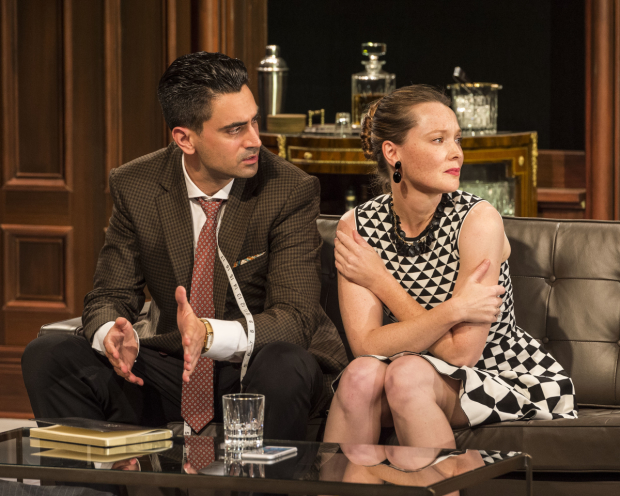Vicuña
This year’s election-inspired world premiere by Jon Robin Baitz runs at the Kirk Douglas Theatre.

(© Craig Schwartz)
While the zaniness of the Trump vs. Clinton battle for the White House could inspire no shortage of ripped-from-the-headlines entertainment, Jon Robin Baitz's latest play conclusively proves that certain headlines now need to be stitched back up again, preferably with impregnable steel wire.
In Vicuña, five intelligent, morally compromised people, all of whom speak with the exact same level of erudition, move through a plot that is hugely contrived as well as played out. As whip-smart as Baitz's dialogue often is, and as entertaining as it is to watch a pro like Harry Groener channel his inner autocrat, this world premiere directed by Robert Egan at Center Theatre Group's Kirk Douglas Theatre is more a slog than a kick.
A loudmouthed billionaire developer and reality-show star named Kurt Seaman (played by Groener) is duking it out for the presidency against a politically savvy Beltway insider who is seeking to become the nation's first woman in the Oval Office. We never meet "her," but Seaman's a sexist loose cannon who somehow has struck a nerve with everyday Americans looking to rekindle basic American values.
Behind in the polls and prone to shooting off his yap faster than his campaign can do damage control, Seaman taps New York's finest tailor to outfit him in time for a critical third presidential debate. The man believes that a custom-made suit fashioned by the great Anselm Kassar (Brian George) will bewitch the debate-watching millions into seeing past his foibles and recognize his greatness. "Picture it: I walk across the stage, I sit on a stool, every network around the world — on me," he says. "As I cut her to shreds and then win!"
The outwardly apolitical Anselm feeds into his customer's line of thinking, particularly since the cost of delaying his current clients and scissoring into a bolt of the finest vicuña wool will cost Seaman a cool $150,000 (that price includes two shirts and ties). Money or no money, Anselm's accepting the job does not sit well with his apprentice Amir (Ramiz Monsef), a principled young Irani — and the son of immigrants — who recognizes Seaman for the monster that he is.
Over the course of a series of fittings, Amir finds himself first sparring with Seaman and warming to Srilanka (Samantha Sloyan), Seaman's daughter and campaign manager, but increasingly not his apologist. That's right: "Srilanka," like the country, daughter of Seaman's first wife, Cornucopia.
With his Dickensian names and double entendres ("Women love Seaman and Seaman loves women"), Baitz seems to be having a grand old time ribbing the current election landscape. Indeed, the very mention of the name "Srilanka" by other characters is often sufficient to draw audience laughter. Those laughs, however, feel off in a play that is positioning itself uncomfortably between satire and righteous outrage over an America that its audience is currently witnessing. Though set in the present, under Egan's direction Vicuña feels like an old-fashioned political fable.
As embodied by Groener, who works just enough charisma into Seaman to keep us invested, the candidate is not a buffoon or a parody; he's a very dangerous hombre. His run-in with the chair of the Republican National Committee, Kitty Finch-Gibbons (Linda Gehringer), is a great bit of showmanship on both actors' parts. It concludes with Seaman dressed to the nines in a six-figure vicuña suit while Finch-Gibbons is clad in a tacky sailor's outfit (all nicely realized by costume designer Laura Bauer). As Vicuña makes abundantly clear, clothes do, under certain circumstances, make the man. In others, they can take him down.
Going heavily with dark, museumlike hues, scenic designer Kevin Depinet fashions the atelier's posh fitting room with an appropriate dash of luxury. Anselm is based on the late presidential tailor Georges de Paris. Depinet's tasteful and high-end locale, complete with elevator, sets the tone beautifully.
Monsef and Sloyan share some appealing sexual tension, but both their characters and their relationship grow less interesting the clearer it becomes that both are on the (Seaman-less) side. In the play's least flashy role, George shines as the tailor who has grown from humble origins to a man who knows the cost of doing business at a very high level. Until, perhaps, he doesn't.
Vicuña's highly predictable conclusion intends to sound an alarm that an apocalypse is at hand. Fair enough, but after such a steady stream of campaign trail ugliness, did we really need a magical $150,000 suit and besieged immigrants to bring us to this realization? Whether Vicuna has a shelf life past Nov. 9 will be interesting to see.









